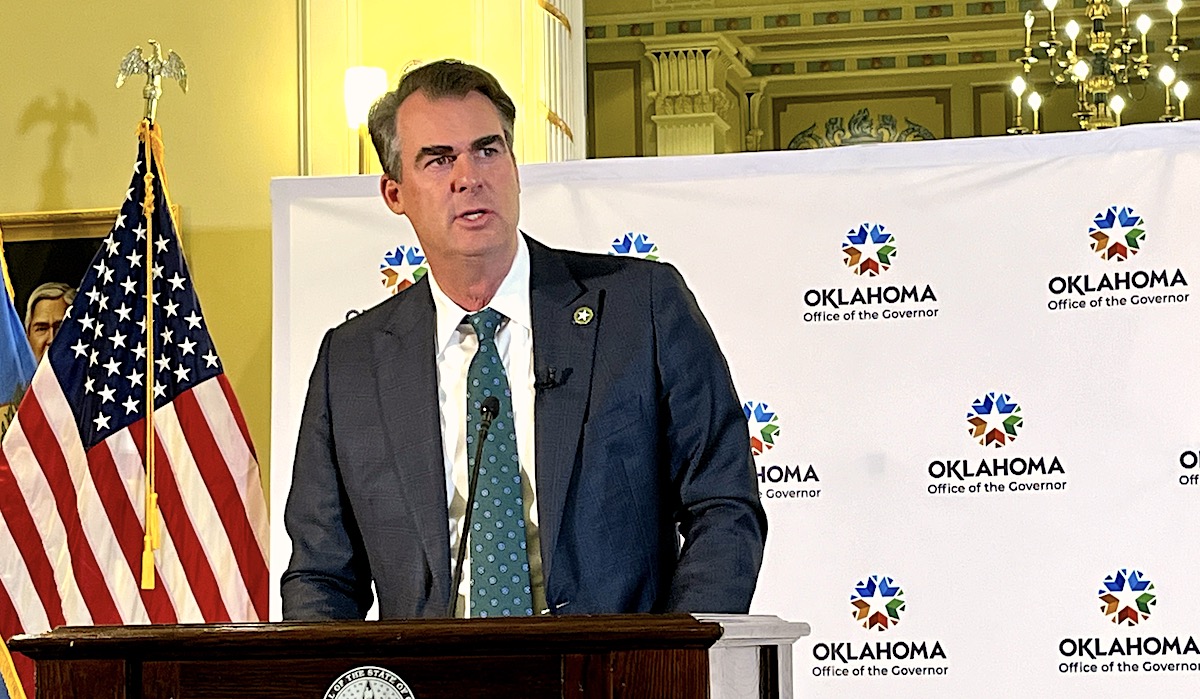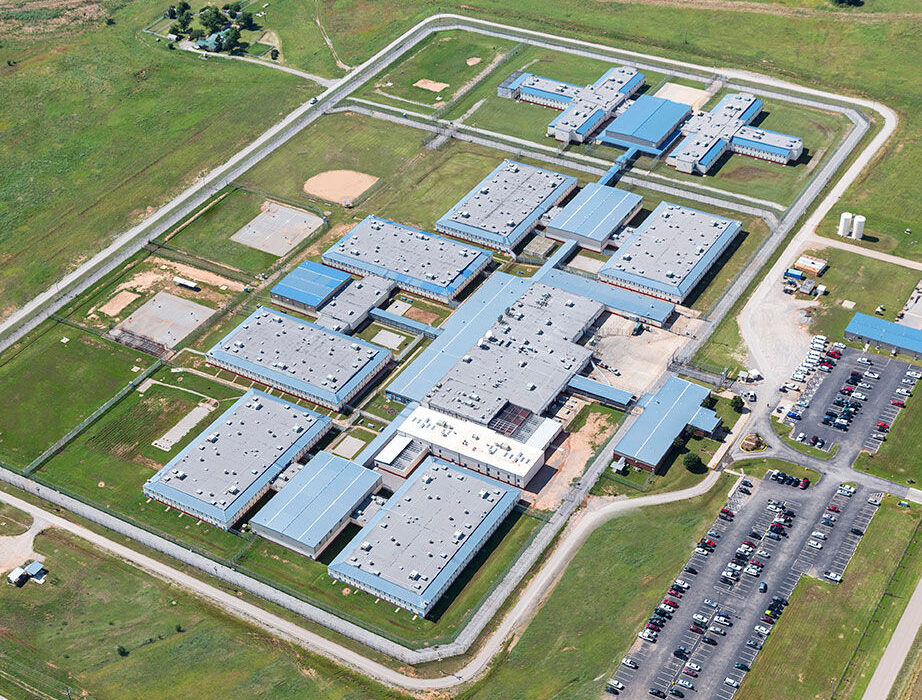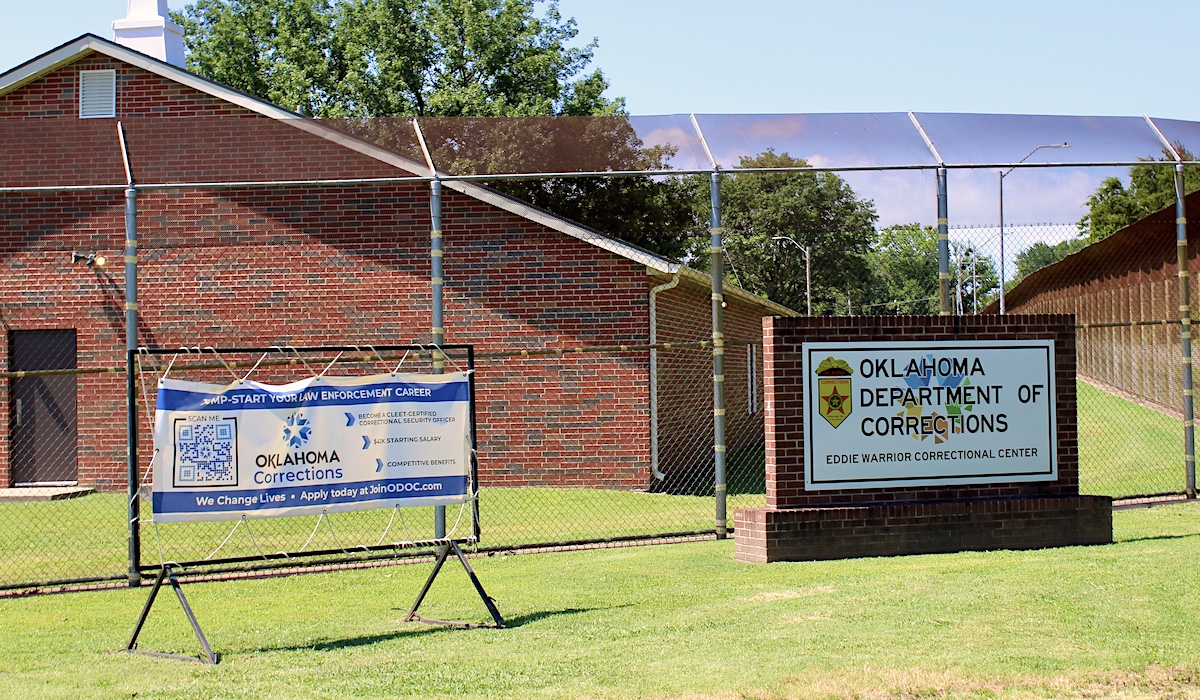

TAFT — Following tense last-minute negotiations between state officials and the GEO Group, the Oklahoma Board of Corrections voted Wednesday to revise and renew an agreement with the private prison company that controls the Lawton and Hinton facilities housing about 23 percent of state inmates.
Annual contract negotiations had deteriorated over the last month after Gov. Kevin Stitt vetoed an increase in per-inmate payments to the GEO Group, whose leaders responded with a pair of June 17 letters promising withdrawal from their agreement in Lawton and threatening termination of the state’s prison sub-lease in Hinton unless the Oklahoma Department of Corrections authorized $3 million in repairs.
Only a week later, however, the drama dissolved as the Board of Corrections — now an advisory board with specified governing duties — voted in favor of a revised version of the Lawton contract between DOC and the GEO Group.
“We had real options. So when we go to the negotiation table, we don’t bluff,” DOC director Steven Harpe said after the meeting. “We had real options that we could have chosen. At the end of the day, the GEO contract we’ll commit to in Lawton was the right thing for us to do.”
Outlining the terms of the FY 2025 contract (embedded below), officials said the revisions will relocate 238 inmates from the GEO Group’s troubled Lawton Correctional and Rehabilitation Facility and decrease DOC’s total payments to the company by about $1.7 million compared to the prior year.
Currently, GEO Group owns and operates the Lawton prison, and DOC pays the company a per-day, per-inmate fee to house more than 2,000 offenders. But after Wednesday’s meeting inside the Eddie Warrior Correctional Center, Harpe said this year’s contract negotiations mark a first step toward the state agency changing its relationship with GEO to mirror other private prisons where DOC only rents the facilities and staffs and operates them with state employees.
“The deal itself will keep us in Lawton for the next year. So, what will happen is we’re going to take on a lease agreement,” Harpe said. “The idea is that we want to remove GEO as the employer there over the next 12 months, just like we did in Davis with the Allen Gamble Facility.”
Harpe said the negotiation outcome of relocating more than 200 inmates is an attempt to get some of the violence at the Lawton facility under control after reports of multiple homicides at the GEO-operated prison this year alone. He said the population reduction will also relieve some of the overcrowding issues, and Wednesday’s agreement alleviates concerns about how DOC would have handled relocation of more than 4,000 combined medium and high-security offenders in a short amount of time.
The Lawton facility is the last privately owned and operated prison housing state inmates. At the Great Plains Correctional Facility in Hinton, the GEO Group controls a long-term lease on the prison, which is owned by the Hinton Economic Development Authority. In 2023, DOC agreed to sub-lease the Hinton prison, an arrangement DOC officials said would be renewed in October.
Harpe described the new Lawton contract as a potential win for both parties, with GEO receiving more funding per inmate while housing fewer people overall. The DOC is set to save nearly $2 million in its contract with the private prison conglomerate.
After approval votes from six of the seven board members, the new GEO contract for the Lawton facility went to the Attorney General’s Office for review, and it was approved Friday.
“It’s going to be cheaper to run for the next year for us,” Harpe said. “We will draw down offenders, and then we’ll also be able to have a plan and get our staff inserted sooner to start working with them to get it better for all the inmates.”
Meanwhile, the GEO Group remains in litigation with the Hinton Economic Development Authority, which built the Hinton prison in the 1990s and has charged GEO and its predecessor a $1.25 per-inmate, per-day fee for decades. But when GEO subleased the prison to the Department of Corrections in 2023, GEO stopped paying the fee and beat HEDA to the courthouse, asking a judge to declare that the company does not owe the base management fee on prisoners held by DOC under a sub-lease arrangement.
Harpe said his agency is aware of the GEO lawsuit with HEDA. Although a concern, he said it was not used as part of the department’s negotiation tactics.
“Let’s say for some reason that goes in a negative way and GEO for some reason no longer has that relationship,” Harpe said. “I’m more than confident that we will be able to work with Hinton, and then the state will take the facility.”
Stitt veto leads to GEO Group letters, withdrawal threat

Days after Gov. Kevin Stitt’s June 14 veto of Senate Bill 1167 regarding per-diem funding for Oklahoma private prison contracts, GEO Group officials sent DOC leaders two letters: a discontinuation of contract letter regarding the Lawton prison and a notice of event of default claiming breach of contract at the Hinton prison.
SB 1167 was meant to increase the per diem payments for GEO’s management of DOC offenders in Lawton. The bill called for DOC to increase the $53.31 per diem rate for medium security inmates to $60.01 per day. The increase would have meant an additional $3 million in funding toward GEO’s Lawton facility.
In his veto message, Stitt noted that the bill somehow escaped discussion during the Legislature’s public budget negotiations.
“My administration has consistently prioritized fiscal responsibility and slowing the growth of government,” Stitt said. “This bill would contradict both priorities by entrenching a current government program and creating an unfunded mandate to increase per diem rates paid to private correctional facilities for guarding inmates.”
In 2022, Stitt vetoed a similar bill, SB 1052. That year, the House and Senate chambers both overrode his veto to grant $4.89 million more to the privately operated Lawton Correctional and Rehabilitation Facility and $2.92 million for the same purpose to the Davis Correctional Facility, which is owned by GEO competitor CoreCivic.
This year, GEO again requested more funding, but unlike 2022, Stitt’s veto stood and denied the additional funding agreement GEO had secured from the Legislature. Suddenly, the company threatened to terminate its Lawton contract and enforce a provision about maintenance for the Hinton prison it was subleasing to DOC.
In a June 20 press release, GEO executive vice president of corporate relations Pablo Paez said DOC would have a three-month transition period starting July 1 to remove all incarcerated people within the Lawton facility if new contract terms could not be mutually agreed upon.
“Upon extensive consideration of the current funding levels and resources relative to the present service requirements, we have determined that we are no longer willing to manage the 2,600-bed Lawton Correctional and Rehabilitation Facility without changes to financial and operating terms,” Paez said in the release.
Pertaining to the Lawton facility, DOC chief of communications Kay Thompson released a statement June 20 saying the agency was taken by surprise when GEO sent the discontinuation letter.
“The Oklahoma Department of Corrections has been engaged in ongoing contract negotiations with the GEO Group, which operates the Lawton Correctional Facility,” Thompson said June 20. “Last Friday, GEO sent us and Oklahoma Senate leadership a letter of discontinuation for LCF. It is unclear why they felt our internal negotiations needed to be elevated to a state level.”
Alongside the Lawton discontinuation letter, DOC officials received a notice of event of default for the Hinton facility, claiming that poor facility maintenance, damage by offenders and neglect to the prison meant DOC had 30 days to make $3 million worth of repairs or else GEO would terminate the contract.
Harpe and other DOC officials only spoke briefly about the Hinton prison at Wednesday’s meeting, but in an interview afterward, Harpe said all necessary repairs had already been made and that DOC’s agreement with the GEO Group at Hinton would continue.
“I don’t even know where the $3 million came from,” Harpe said. “But I will tell you from working with GEO, they’ve taken all of that off the table.”
According to the June 27 Oklahoma Department of Correction daily statewide population report, the state only has about 956 vacant beds as well as 1,029 “county jail backlog” inmates who are waiting for state prison placement. As a result, the state prison population report indicates there would not have been enough space in state institutions to relocate all of the people housed in both GEO facilities had an agreement not been reached.
With offender families, media and DOC officials present at Wednesday’s meeting, Harpe’s announcement of a new deal surprised many onlookers after several days of speculation and reporting that the state would have no choice but to relocate thousands of offenders — either in-state or out-of-state — and negotiate new contracts with other entities.
Follow @NonDocMedia on:
Facebook | X | Text or Email
GEO acknowledges ‘significant challenges’ at Lawton prison

In order to house medium and maximum security inmates safely, GEO officials criticized Stitt’s veto by saying the company required more funding for facility updates.
“We are obviously disappointed that the additional $3 million in funding approved by the Legislature for the facility has been vetoed, marking two successive years of inadequate funding for the contract,” GEO Group executive chairman George Zoley wrote in the June 17 Lawton letter. “We cannot continue to provide the facility and associated correctional services without adequate funding and relief from systematic facility overcrowding. ”
Thompson responded by saying GEO’s request for additional funding posed an excessive financial burden given the company’s management results at the facility.
“Over the last four years, GEO has received a $6.8 million increase in funding,” Thompson said. “Yet, their operations have not improved — being the most violent prison in Oklahoma — and continue to lack the standard of care expected by ODOC. Our dissatisfaction with the current state of LCF and GEO’s facility operations has reached a critical point.”
In his June 20 statement, Paez clarified GEO’s recent funding allocations and said that all funding increases received from the state were put toward wage increases for prison staff, implying the additional funds are needed for infrastructure and security.
“In recent years, wage inflation and staffing shortages, following the COVID pandemic, have negatively impacted staff recruitment and retention at all state correctional facilities,” Paez said. “Unfortunately, the recent veto of funding that was approved by the Oklahoma State Legislature will only exacerbate our significant challenges.”
Those challenges included what DOC described as a “group disturbance” May 10 that left two inmates dead and three injured at the Lawton prison operated by the GEO Group. The incident was caused by two rival groups that started fighting, officials said.
Rep. Justin Humphrey, the chairman of the House Criminal Justice and Corrections Committee, has derided DOC’s decisions and processes since Harpe became director. In a statement to KOCO, he called the Lawton incident “the biggest disaster I’ve ever seen in my history of 35 years working very closely either in or with the Department of Corrections.”
Humphrey (R-Lane) was present at the beginning of the Board of Corrections meeting Wednesday, but he left before the board’s private prison contract vote. Later that day, Humphrey posted on Facebook that he was disappointed that major topics such as “massive staff shortages, violence, extortion, conditions and other serious issues” were not addressed by the board.
The newly approved contract will be the start of what Harpe describes as an 18-month strategy to transition all of Oklahoma’s private prison contracts to systems where the state leases and operates the facilities.
“We’ve proven the model at Allen Gamble. We’re going to reproduce that [in Lawton],” Harpe said. “The violence has been a big driver for us and so has the cost, so we did go through a pretty contentious negotiating experience on this one. But in the end, we got exactly where I want to be.”
GEO is currently fighting litigation with HEDA

While GEO is preparing for another year of partnership with the DOC in Lawton, it is also in the middle of litigation with the Hinton Economic Development Authority involving the $1.25 per diem payments listed in the company’s original contract with HEDA. Apparently anticipating potential litigation from the western Oklahoma city’s economic development entity, GEO filed a complaint for declaratory judgment in November 2023.
HEDA, which owns the Great Plains Correctional Center, entered into a lease agreement with Cornell Corrections of Oklahoma in December 1999 after building the prison. Cornell agreed to make annual rent payments to HEDA pursuant to the terms of the lease agreement.
In March 2000, HEDA and Cornell entered into an “intergovernmental and private prison contract agreement” that established Great Plains as a medium-security facility for housing inmates and set a base management fee.
In 2010, Cornell merged with the GEO Group, making GEO the successor of all standing contracts Cornell had with outside entities. In this case, GEO became subject to all the rights and obligations entrusted in the lease agreement Cornell established with HEDA.
“GEO Group has timely paid all rents owed to HEDA under the terms of the lease agreement,” the company’s court complaint stated. “GEO Group has fulfilled all of its obligations to HEDA under the terms of the lease agreement.”
In January 2021, President Joe Biden issued an executive order directing the U.S. attorney general not to renew contracts housing federal inmates in private prisons.
In May 2021, the U.S. Bureau of Prisons withdrew its federal inmates from the GEO-run facility in Hinton. It closed, remaining vacant from May 2021 until May 2023 when GEO entered into a sublease with DOC to become operator of the facility.
The original lease — agreed to by HEDA and Cornell and later taken over by the GEO Group — contains a provision for HEDA to be paid $1.25 of any per inmate per day fee “for each inmate at any time housed in the facility.”
With DOC now operating the Hinton prison instead of the company, the GEO Group has refused to pay the base agreement.
“In 2023, the Oklahoma Department of Corrections began housing inmates at the facility under the direct supervision and control of the Oklahoma Department of Corrections,” GEO attorney Randall Wood wrote in the court complaint. “GEO Group does not staff the facility and does not serve as a private prison contractor for the supervision of inmates at the facility. Because there is no inmate contract existing between GEO Group, Hinton and/or HEDA and the Oklahoma Department of Corrections for the supervision and housing of inmates, there is no base management fee available to GEO Group under the IPPCA. Thus, HEDA and Hinton are not entitled to reserve any payments out of a base management fee.”
Through its attorneys, Kim Spady and Andy Lester, HEDA answered the complaint with a 13-page counterclaim, attaching the original 114-page lease agreement to it.
“Prior to the Oklahoma Department of Corrections’ execution of the contract
related to the facility, plaintiff purported to engage in good faith discussions and
negotiations with HEDA,” Spady and Lester wrote. “Plaintiff represented, and HEDA believed, that plaintiff would honor the prison contract consistent with the parties’ prior course of conduct by making prisoner per diem payments to HEDA. Plaintiff has waived any right to claim that the prison contract is not applicable under the present circumstance.”
HEDA’s counterclaim asks the court to rule that the lease and prison contract constitute a “single, non-severable agreement,” uphold the original agreement to pay the monthly $1.25 per inmate day, declare a breach of contract, and disallow GEO to lease the facility to the state until payments have been made.
The litigation between the GEO Group and HEDA is pending before U.S. District Court for the Western District of Oklahoma Judge Charles Goodwin.
Read the DOC and GEO Group revised Lawton contract
